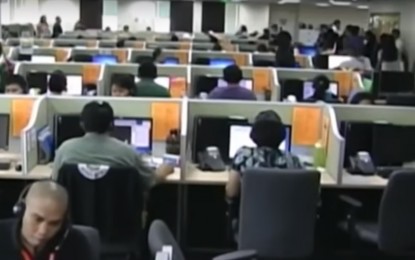More onsite work OK but internet services must be improved

MANILA – Partido Reporma presidential candidate Senator Panfilo “Ping” Lacson and his running mate, Senate President Vicente “Tito” Sotto III are in favor of more onsite or face-to-face work due to its benefits to the economy.
They, however, said improvements must be made on the country’s internet services for industries and businesses who wish to continue work-from-home (WFH) arrangements.
“May tama ang economy pagka nag-insist tayo sa work-from-home. Maganda ‘yung on-site. Palabasin ‘yung mga bata, magkaroon ng face-to-face sa classes, tapos Alert Level 1, so gagalaw ‘yung economy, definitely. (The economy will be hurt if we insist on work-from-home (setups). On-site work is good. Let the children out, allow them to have face-to-face classes, then (apply Covid-19) Alert Level 1, so the economy will move, definitely),” Lacson said on the sidelines of their campaign sortie in Sorsogon on Thursday.
He also echoed the estimate of Socioeconomic Planning Secretary Karl Chua that the country loses PHP11 billion a week with coronavirus lockdowns or higher pandemic alert levels.
But by opening up the economy with enhanced activity, the country would gain PHP16 billion a week in terms of goods and services as defined by its gross domestic product (GDP), Lacson said.
While some workers have argued that they are more productive with a WFH setup, Sotto, meanwhile, said it really depends on the industry involved.
He added that some would be covered by the Telecommuting Act authored by Senator Joel Villanueva and then Makati congressman Monsour del Rosario, who is now one of Partido Reporma’s senatorial candidates.
“‘Yung telecommuting kung pasok doon ang trabaho, okay (ang) work-from-home pero hindi ‘yung, in general, pwede lahat work-from-home—hindi. Ganoon ‘yung tingin namin. Katulad ‘nung messenger ko sa opisina, messenger ‘yon e, lapit ba naman sa akin, sabi sa akin ‘Sir, pwede ba akong work-from-home?’ Batukan kaya kita, sabi ko. Messenger work-from-home? (Telecommuting is OK depending on the line of work, some are okay (with) work-from-home, but not everything, in general, is meant for work-from-home – no. That’s how we see it. Like my messenger at the office, he’s a messenger, but he approaches me and says, ‘Sir, can I work from home? I’ll hit you, I told him. A messenger, work-from-home?),” Sotto said.
To fully enable telecommuting, Lacson said the government should invest in the Department of Information and Communications Technology (DICT), which was formerly headed by then Secretary Gregorio Honasan, who is now eyeing a return to the Senate in the May polls.
Meanwhile, the tandem also welcomed President Rodrigo R. Duterte’s new directive to include nuclear power in the country’s energy mix.
“Alam niyo ba na ‘yung power sector, 57 percent (doon) ‘yung coal-fired. Napakamahal ng coal kasi nanggagaling pa sa Australia, kasi ‘yung local coal natin dito hindi tama ‘yung Btu (British thermal unit), hindi sapat. Twenty-one percent renewable kasi nagpasa kami, nandoon pa si Senator Chiz (Sorsogon Governor Francis Escudero) ‘non, ipinasa namin ‘yung Renewable Energy Act (Do you know that in the (local) power sector, 57 percent (of producers) are coal-fired (power plants)? Coal is so expensive because it comes from Australia, our local coal does not have the proper Btu, it’s not sufficient. (But the power sector should be made up of) 21 percent renewable (energy sources) because we passed, and Senator Chiz was still there, we passed the Renewable Energy Act (in 2008),” Lacson added.
Republic Act 9513 or the Renewable Energy Act of 2008, provides incentives for renewable energy producers, Lacson said, including no value-added tax (VAT) for several years and tax holidays, especially for solar, biomass, and geothermal power producers.
The Philippines is the second-largest producer of biomass in the world, yet Lacson said the irony of it is the country is just harnessing 1.2 percent of its energy needs from it.
Overall, apart from the 57 percent of its energy needs through coal-fired power plants, the country gets 21 percent from renewable sources and 19 percent from geothermal energy, Lacson added.
The top consideration in using nuclear energy, Lacson said, is its safety, considering the Philippines is the country fourth most vulnerable to the effects of climate change, according to a recent report by a United Nations Development Programme.
The Philippines finished building the Bataan Nuclear Power Plant (BNPP) in 1986 but never fueled it, in part because of the Chernobyl disaster and the People Power Revolution that ousted the late former president Ferdinand Marcos, who ordered it built starting in 1976.
With a final cost of USD2.3 billion, the BNPP was also opposed by anti-nuclear activists into the 1980s.
The Corazon “Cory” Aquino administration that followed Marcos never used it, citing construction safety and corruption issues, as it would also account for 10 percent of the country’s external debt. (PNA)






